Pianist Tao makes impressive Grant Park debut with Khachaturian concerto

Aram Khachaturian’s Piano Concerto was a fortunate son of World War II. In the rush of wartime cultural propaganda supporting our Soviet comrades in arms, a great deal of not-so-good Russian music was performed extensively in the U.S. Often wildly over-praised in the Western press–Shostakovich’s “Leningrad” symphony is the most famous example—many of these works were quickly shot out of the concert-hall canon when hostilities ceased.
Khachaturian’s Piano Concerto was one such piece. A superb recording by William Kapell helped prolong the work’s life but it soon fell into semi-obscurity, unaided by the Armenian composer’s deserved reputation as a pliable propaganda tool of the Soviet state. Every few years, someone will poke Khachaturian’s concerto with a stick to see if it’s still alive.
Such was the case Friday night at the Pritzker Pavilion when pianist Conrad Tao made a most impressive Grant Park Music Festival debut, performing the composer’s problematic concerto with Carlos Kalmar and the Grant Park Orchestra. The program will be repeated tonight.
As Kalmar noted in his introduction, there is more than a whiff of Soviet agitprop in the lumbering themes and repetitive style of Khachaturian’s concerto. The slow movement is also rather pallid, a would-be Rachmaninoff interlude minus the tunes.
It takes a personality-plus pianist with a fearless technique to make a compelling case for this second-rate music and Conrad Tao did that and more Friday night. The American pianist attacked the outer movements with unbridled bravado, his jumpy intensity providing a quirky sensibility to the music while maintaining amazing digital accuracy. The soloist’s hard, metallic edge was less suited to the Andante, where a softer, more relaxed touch would have conveyed more of the exotic languor. Yet Tao brought a nice, jazz-like fantasy to the extended cadenza of the first movement.
The galumphing finale isn’t among the high points of 20th century music, but with Tao romping through the solo fireworks at a blistering tempo it was undeniably thrilling. The tight accompaniment of Kalmar and the orchestra proved just as exhilarating, with the conductor exploring more of the Armenian coloring in the contrasting, introspective pages.
The hyperkinetic pianist introduced his own encore. Noting that it was Pride weekend, Tao performed Scarlatti’s Sonata in A major, K.208, which he dedicated to the late harpsichordist and Scarlatti specialist Scott Ross who died of complications from AIDS in 1989–what Tao called “a shameful time in our country’s history.” His measured and poignant rendering made an apt tribute.
With a series that has done enterprising programming for eight decades, there is not a lot of standard repertoire that hasn’t been heard at Chicago’s summer music festival. Yet Friday night, surprisingly, marked the first complete lakefront performance of The Firebird.
Some of the scoring subtleties of Stravinsky’s kaleidoscopic ballet were inevitably lost in an al fresco setting with generous amplification. The opening section could have been more rapt and intimate, but after that Kalmar proved an expert guide through the 47-minute ballet.
The conductor’s linear direction had a nice organic flow, taking us through the magical weirdness of the scenario with a delicately charming “Round of the Princesses” and a vehement but not over-the-top take on “King Kastchei’s Infernal Dance.” The final section was especially inspired with Jonathan Boen lofting an atmospheric horn solo and Kalmar building the Berceuse theme to a resplendent coda.
The evening began with Infernal by David Schiff. The Portland-based composer/critic retools “Kastchei’s Infernal Dance” from Firebird into a contemporary jazz idiom–proving that great music is like titanium, and can withstand all kinds of treatment. Schiff’s riff is more swing than savage, yet cleverly done and faithful to the original’s notation and accents. Kalmar and the orchestra served up a sassy, big-band reading with high-stepping panache.
The program will be repeated 7:30 p.m Saturday. gpmf.org
Posted in Performances

